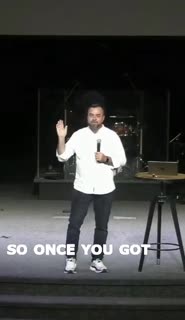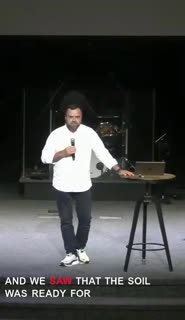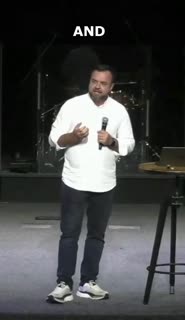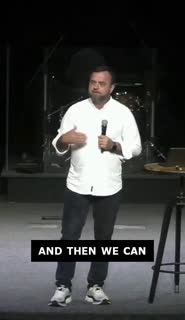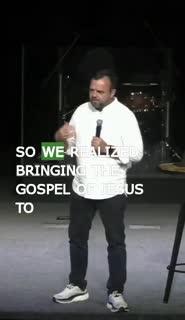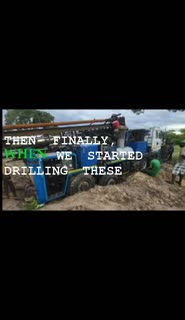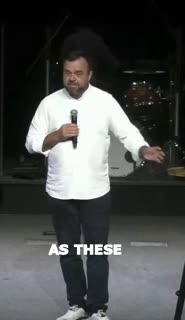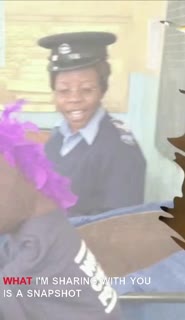Transforming Lives Through Faith and Community in Zambia
Devotional
Sermon Summary
Bible Study Guide
Sermon Clips
1) "So once you got into that area, you saw the deep spiritual need because of generations of people that have never seen Jesus or followed him. And I remember your team came to help us and assist us in Zambia, and Pastor Fred and Esther came, and we didn't really know what to expect. And they brought some people in that were intercessors and praying with us. And so we started out to the western part of Zambia. The roads were terrible, and there was really no paved road. So there was this gravel road, and if you drove on it, it made this big dust cloud. So if you got caught behind a truck, God bless you. It was one of those faith moments because you couldn't see when you drove, and you hoped that there wasn't another car coming from the front. But we endured, went through that." [05:44] (51 seconds)
2) "And we saw that the soil was ready for planting, and it was really ready. There was such a need for the gospel in that part of the world. So after they left, the first time, we established a base on the river of the Zambia Sea, and then Pastor Fred came back with Esther, and they helped us with some vehicles to be able to assist us in starting up the work there. I remember going into those areas when we first started building the base on the river and I would use up every cent in my credit card and then I'd go home and we'd save up again and months later we'll come back and we would continue to build. And eventually we established this base and now we were ready to start working." [07:08] (45 seconds)
3) "And so then we started seeing this vehicle drive up. And there was this man who brought children to our children's church. And very soon after that, we realized this was the local witch doctor. He would actually come and transport his kids, his grandchildren at the time. And he would bring them to our children's church because in the Western part of Zambia, where there's nothing, there's no nothing but just villages and rural areas. This is like the talk of the town. We would like to show. I mean, it was amazing. Nobody had done anything for children. And suddenly all of this was happening there. So everybody started flocking there, including the witch doctor with his grandchildren. He would sit in the car and the kids would come and they got saved." [10:01] (46 seconds)
4) "And then we can continue to, to work with these villages. But in the middle of this, we realized the desperate need of, uh, wells and water in that area. And now I've been in ministry over 30 years, and I wish I could tell you that I'm very smart, but I'm not. I wish I could tell you that I'm the best strategist there is, but I'm not. But I am smart enough sometimes just to see when there's a need in the room. And I think sometimes what God does is Romans two verse four says, it is the goodness of God that leads men to repentance. So when we're called to bring change to a community, sometimes it looks a little bit different than just speaking to somebody about Jesus. It could be drilling a well away from the river so that you have fresh water and in the process, protecting people who are caught by crocodiles." [12:59] (51 seconds)
5) "So we realized bringing the gospel of Jesus to people who are in that environment really means for us to start drilling wells. I don't know if you've ever drilled a well. I haven't at that stage. It's not as easy as it looks. we went to Joyce Meyer Ministries, who was part of our partners, and we asked them to help us to buy a rig. And we thought we would get one of these little trailer units that you get behind the vehicle. And we'd go in there and we would just bump them out like, I mean, it's going to be amazing, I tell you. So they asked me how many wells would I drill? I said to them, I think I can do 10 in a month. And the director of Joyce Meyer Ministries, he's a friend of mine, his name is Brad. He said, Jacques, let's start with five. I said, okay, five. I think I can do five in a month." [14:20] (50 seconds)
6) "And then finally, when we started drilling these wells, we started planting more kids' churches. And for every three wells we would drill, we would have one children's church where children would gather and we would be able to lead people to the Lord. So we continued to work up and down the river and then into the bush of Zambia. And we drilled over 400 wells to date. And I want to tell you about one story where I was sitting in a village where we were opening the well and there were a bunch of people sitting there. So I asked them, would you give money for us to be able to drill a well for somebody else in another village? Because we're going to give you this well today. And I asked them, put up your hand if you'll give us some money. And they said, yeah, we're going to do it. And I said, yeah, we're going to do it. Nobody put their hand up. And I said to them, so why do you think other people who don't know you should give money so that you can have this well if you're not willing to do it? And then I said, you know what the difference is? It's Jesus. Let me tell you about him." [15:34] (61 seconds)
7) "So then as these children's churches grew and we started planting more of these children's churches along the river as we were drilling these wells, we started losing some of the girls to child marriage. We realized we didn't really know what was going on. The very girl that wrote down the reason what our best day and worst day was, we actually, she wasn't coming to children's church anymore. So our leader, I asked Simba to go follow up. And when he got to the house, they would hide this girl at first. And then later on, we found out she was married off to a man in Mongu, which is a city a little bit north of us. And she was his third or fourth bride. And he was 50, 60 years old. And then we realized there was a practice to marry off children as part of child brides." [18:08] (52 seconds)
8) "What I'm sharing with you is a snapshot of what's happened. In Zambia since you've been there and the seed that you've put in the ground has helped us to be able to go far and do a lot. And the most amazing thing is when you realize that you're not alone, that sometimes when you go into some of these places that are hard, you find out that there are other people who are with you, even though it's a half a world away, we're nine hours difference in our time zones. And it's amazing that we can actually be in another part of the world in a day's time. With our technology we have in our in the world today." [19:27] (39 seconds)
Ask a question about this sermon
2) "And we saw that the soil was ready for planting, and it was really ready. There was such a need for the gospel in that part of the world. So after they left, the first time, we established a base on the river of the Zambia Sea, and then Pastor Fred came back with Esther, and they helped us with some vehicles to be able to assist us in starting up the work there. I remember going into those areas when we first started building the base on the river and I would use up every cent in my credit card and then I'd go home and we'd save up again and months later we'll come back and we would continue to build. And eventually we established this base and now we were ready to start working." [07:08] (45 seconds)
3) "And so then we started seeing this vehicle drive up. And there was this man who brought children to our children's church. And very soon after that, we realized this was the local witch doctor. He would actually come and transport his kids, his grandchildren at the time. And he would bring them to our children's church because in the Western part of Zambia, where there's nothing, there's no nothing but just villages and rural areas. This is like the talk of the town. We would like to show. I mean, it was amazing. Nobody had done anything for children. And suddenly all of this was happening there. So everybody started flocking there, including the witch doctor with his grandchildren. He would sit in the car and the kids would come and they got saved." [10:01] (46 seconds)
4) "And then we can continue to, to work with these villages. But in the middle of this, we realized the desperate need of, uh, wells and water in that area. And now I've been in ministry over 30 years, and I wish I could tell you that I'm very smart, but I'm not. I wish I could tell you that I'm the best strategist there is, but I'm not. But I am smart enough sometimes just to see when there's a need in the room. And I think sometimes what God does is Romans two verse four says, it is the goodness of God that leads men to repentance. So when we're called to bring change to a community, sometimes it looks a little bit different than just speaking to somebody about Jesus. It could be drilling a well away from the river so that you have fresh water and in the process, protecting people who are caught by crocodiles." [12:59] (51 seconds)
5) "So we realized bringing the gospel of Jesus to people who are in that environment really means for us to start drilling wells. I don't know if you've ever drilled a well. I haven't at that stage. It's not as easy as it looks. we went to Joyce Meyer Ministries, who was part of our partners, and we asked them to help us to buy a rig. And we thought we would get one of these little trailer units that you get behind the vehicle. And we'd go in there and we would just bump them out like, I mean, it's going to be amazing, I tell you. So they asked me how many wells would I drill? I said to them, I think I can do 10 in a month. And the director of Joyce Meyer Ministries, he's a friend of mine, his name is Brad. He said, Jacques, let's start with five. I said, okay, five. I think I can do five in a month." [14:20] (50 seconds)
6) "And then finally, when we started drilling these wells, we started planting more kids' churches. And for every three wells we would drill, we would have one children's church where children would gather and we would be able to lead people to the Lord. So we continued to work up and down the river and then into the bush of Zambia. And we drilled over 400 wells to date. And I want to tell you about one story where I was sitting in a village where we were opening the well and there were a bunch of people sitting there. So I asked them, would you give money for us to be able to drill a well for somebody else in another village? Because we're going to give you this well today. And I asked them, put up your hand if you'll give us some money. And they said, yeah, we're going to do it. And I said, yeah, we're going to do it. Nobody put their hand up. And I said to them, so why do you think other people who don't know you should give money so that you can have this well if you're not willing to do it? And then I said, you know what the difference is? It's Jesus. Let me tell you about him." [15:34] (61 seconds)
7) "So then as these children's churches grew and we started planting more of these children's churches along the river as we were drilling these wells, we started losing some of the girls to child marriage. We realized we didn't really know what was going on. The very girl that wrote down the reason what our best day and worst day was, we actually, she wasn't coming to children's church anymore. So our leader, I asked Simba to go follow up. And when he got to the house, they would hide this girl at first. And then later on, we found out she was married off to a man in Mongu, which is a city a little bit north of us. And she was his third or fourth bride. And he was 50, 60 years old. And then we realized there was a practice to marry off children as part of child brides." [18:08] (52 seconds)
8) "What I'm sharing with you is a snapshot of what's happened. In Zambia since you've been there and the seed that you've put in the ground has helped us to be able to go far and do a lot. And the most amazing thing is when you realize that you're not alone, that sometimes when you go into some of these places that are hard, you find out that there are other people who are with you, even though it's a half a world away, we're nine hours difference in our time zones. And it's amazing that we can actually be in another part of the world in a day's time. With our technology we have in our in the world today." [19:27] (39 seconds)
